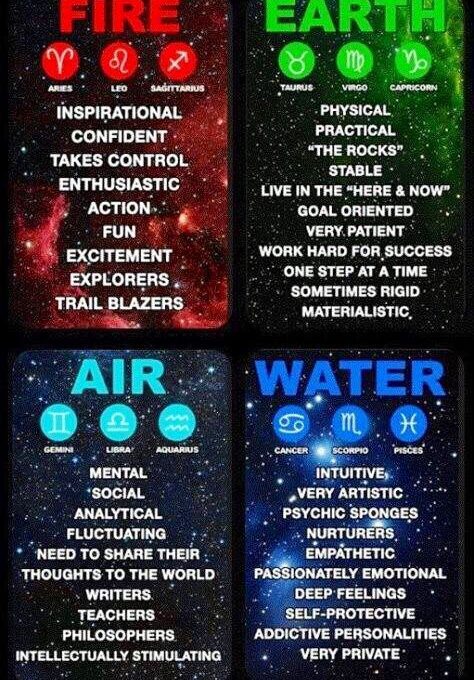The concept of the five elements comes from Ayurvedic philosophy, which sees the Universe as one being— namely, prana. Prana, which means ‘breath’, is the Universal energy of All-That-Is. Everything is made of prana— that is, everything is energy, and all of this energy is unified.
Ultimately, there is no difference between you, me, the chair, the dog, the paper clip, the Waterfall, Jupiter, the solar system, and the Universe. It is all one energy.
This one energy has five modes of expression. These modes or patterns of energy are understood as the five elements: Air, Fire, Water, Earth and Ether.
Five elements
All of life can be understood in terms of these five elements. There are five elements within your body, and five elements within your psyche. There are five elements in any creative undertaking, and within any functioning business or enterprise. There are five elements within any relationship, and five elements in the relationship among all the parts of your life. All of your activities, and all the activities of Nature, can be understood in terms of five elements.
The five-element system can be used typologically, as one element usually predominate in temperaments, bodies, endeavors and relationships. Some people have a fiery temperament, while others have a distinctly Earthy temperament. Each person has an elemental body type which is characterized by certain patterns of metabolism, weight distribution and musculature. Many relationships have a signature element, a certain energy or focus that formulates the bond fusing two or more people together.
When we understand each element well, we have the ability to bring holistic balance to any body, entity, relationship or undertaking. We have an enhanced ability to discover the root cause of any issue by identifying which element is lacking and which is in excess. We have an ability to bring the holistic balance of the cosmos itself into our daily routine by making sure to integrate some of every element into every day, or even into every activity in every day!
Let’s explore the meaning of each element.
Ether
Ether is the ground or field from which the other elements arise. It is a unified field which creates subtle space for the movement of other elements. The basic qualities of this element are stillness, harmony and balance. While the other four elements are in dynamic relationship to one another, Ether is not a dynamic, moving element, but one which provides the space for the movement among the others.
Ether governs the qualities of mind which relate to tranquility, peace and stillness. This peaceful quality is also related to aesthetic sensitivity. Great natural beauty, such as beautiful flowers, a peaceful forest, a stunning sunset can help us to touch the place of introspection and peace. Beholding such wonders does not coming from doing but from being without needing to do, achieve or become.
Ether also creates the space for emotions to flow freely. We all know what it feels like to become so busy that we do not even know what we feel. The mind and body become so cluttered with words and deeds that there is no room for our emotions to flow. A contracted Ether field leads to either depression and lethargy or explosiveness.
In any creative process or undertaking, Ether corresponds to the stage before creation within which a desire or need is realized. Without Ether, there is no place for inspiration to flow into. We must be somewhere in a field of experience in order to discover that something is needed or wanted. Temperamentally, Ether corresponds to those people who are good at “holding space” and maintaining neutrality. Such people may have a therapeutic or uplifting effect even without realizing it, and may seem generally serene and tranquil.
Air
Air is identified with movement. Movement is necessary for any process. Fire without the movement of Air can’t start. Water without movement grows murky and toxic. Earth without movement becomes calcified and rigid. The expression of Air in the world is speed and motion, and it combines with other elements to create various qualities of movement.
Air governs the movement of our thought processes, our emotional life and our internal physiology. Congestion of Air in any of these processes produces rigidity, stagnation and buildup in that sphere of life. In the body, Air corresponds to the cleansing processes of the body such as the removal of waste by the kidneys, lungs, colon and skin. Imbalance of Air in the body may underlie rigid, stiff joints, or lack of movement in the digestive process.
On the level of mind, an ‘Airy’ person may “quick-witted” with fast reflexes and a fast sense of humor, while some one lacking in Air may be rigid and unable to flow with new ideas or approaches. On the level of our emotions, Air brings the refreshing wind of a change in perspective or the transformation of feeling. One without this movement becomes excessively attached to pain or craving, refusing to let anything go.
Thought is also movement and the Air element governs mental activity in general. In creative process, Air corresponds to the stage of thinking, planning, designing and visualizing. An Airy person tend to be caught up in thought, out of touch with their emotions and their bodily sensations, appearing “above it all” or detached from earthly realities. People with imbalanced Air can also over-think to the point of never acting.
Fire
While Air is movement, Fire is the warm expansive impulse behind the movement which directs its course. Fire is the driving force behind bodily functions, the vital force of the body’s energy system, and the primary directive of the human will. Fire is the animating desire that gets us out of bed in the morning and the drive to life that is within every single cell. Fire is propulsive, expansive and outward moving— specifically directed toward its aim.
Fiery people have a lot of enthusiasm for life and focus that enthusiasm effectively into activity. They have the “get-up-and-go” quality of high achievers and world leaders; they are often highly charismatic, magnetic and willful. An imbalance of this quality can be seen in selfishness, callousness or bluntly direct speech.
In the body, Fire corresponds to the healing processes like fever which cleanse and purify, as well as digestive processes which provide us with the fuel we need to “burn” to get things done. Fire is seen as the spark of life itself, and this is often visible in the eyes. People with a lot of energy and vitality often sparkle in the eyes, while lethargic people often have cloudy or bleary eyes.
Fire is also associated with “insight” on mental and emotional levels. Insight is not the same as mere knowledge; in order to have insight, we must have a desire and an aim. In processes, Fire correlates with the animating inspiration which is necessary to keep people driven toward a common aim. It is associated with a sense of purpose, meaning and faith in something greater than the self.
Water
Air and Fire are expansive and light; Water and Earth are contractive and dense. Water governs the unconscious, emotions and deep feelings. It corresponds to the plane of dreaming, intuition and a Knowing beyond reason.
When Water is flowing well, we are in touch with our feelings and allowing those feelings to be as they are without becoming attached. We can process whatever it is that we’re feeling, whether it’s grief, anger, fear or joy, without getting bogged down in it. We can use the strength of Water— the ability to move freely around any obstacle and seek the path of resistance— to our advantage. When Water is constricted, our behavior is governed by highly unconscious processes and we are permanently in a reactive mode of being, rather than a responsive one. We become overly attached and identified with how we feel: addicted to pleasure, needful of joy, clinging to rage, indulgent in self-pity, wallowing in guilt, and so forth.
In the body, Water corresponds to the fluids of the body including sexual fluids, lymphatic system and the mucus glands. It is associated with the processes of cleansing a regeneration. Watery people are highly subjective, intuitive and emotional, while people with a Water imbalance may be materialistic, closed-minded and out of touch with feelings. In creative process, Water corresponds to the grounding of abstract ideas through action, just as Water grounds down into the Earth, nurturing all life into being.
Earth
Earth corresponds to physical manifestation and form. The Earth upon which we rest is steady, solid, consistent, sturdy and trustworthy. Similarly, an Earthy person is reliable, predictable, and competent because he is rooted in the hard facts of physical reality.
The Earth element is associated with a firm foundation, whether that is a firm foundation in our thinking processes, our emotions or our physical bodies. When we are grounded, our thoughts are based in sound reason and fact, and our words match our actions. Our emotional reactions are proportionate, measured and sensible, and our physical bodies are strong, sturdy and well-balanced.
When we are imbalanced in Earth, our thoughts are unrealistic and we don’t physically act in ways that match our words. We can become highly one-sided, overreactive or irrational in our emotions, and our body can become frail.
In a creative process, Earth is associated with bringing things all the way through to completion. Earthy people are practical and able to plod through anything until the objective has been accomplished.
The post Earth, Air, Fire, Water and Ether: Using the 5 Elements to Create a Fulfilling Life appeared first on askAstrology.


